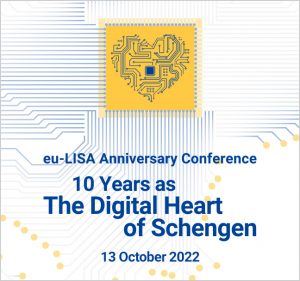The New Information Architecture as a Driver for Efficiency and Effectiveness in Internal Security
16 October 2019 | Hilton Tallinn Park, Tallinn, Estonia
08:30 – 09:00 Welcome Coffee and Registration
09:00 – 09:45 Keynote Addresses: Future of internal security management in the age of digitalisation
- Krum Garkov, Executive Director of eu-LISA
- Ilkka Salmi, Permanent Secretary, Ministry of the Interior, Finland
- Matthias Oel, Director for Borders, Interoperability and Innovation, Directorate-General for Migration and Home Affairs, European Commission
- Mart Helme, Minister of the Interior, Republic of Estonia
09:45 – 11:15 Session 1: Impact of the new information architecture on internal security: efficiency gains and challenges
The session will focus on the impact of the new information architecture on internal security in Europe and will analyse the efficiency gains and challenges brought about by the changes at technical and business levels. The new large-scale IT systems (EES, ETIAS and ECRIS-TCN) and the enhanced existing systems (SIS, VIS and Eurodac), along with the future interoperability infrastructure, are going to facilitate the daily work of a wide range of public authorities responsible for internal security in EU Member States.
Moderator: Anssi Kangas, Chief Superintendent, Finnish National Police Board
Panellists:
- Richard Rinkens, Policy Analyst, Coordinator for Biometrics and Identity Management, Directorate-General for Migration and Home Affairs, European Commission
- Holger Farnung, Deputy Special Representative of INTERPOL to the European Union
- Ana Maria Ruginis Andrei, Head of Architecture Sector, eu-LISA
11:15 – 11:45 Coffee break
11:45 – 13:15 Session 2: Effects of digitalisation on the collection and processing of data for law enforcement purposes
Digitalisation of data, digital processing of data and digitalising work processes are all in all a daily practice for many public authorities in Europe today. Digitalisation, as opposed to paper-based work, has become widespread throughout the majority of European law enforcement authorities. The aim of the session is to analyse the objectives and effects of digitalisation of data processing and workflows, and to discuss how best to support European law enforcement authorities´ efforts towards further digitalisation in order to streamline work on the ground, in the office and among Member States.
Moderator: Guido Brockmann, Head of Product Management Sector, eu-LISA
Panellists:
- Luis de Eusebio Ramos, Deputy Executive Director of Europol
- Georg Biekötter, Political Administrator, General Secretariat of the Council of the European Union
- Patrick Padding, Core Group leader of ENLETS, The National Police of the Netherlands
- Ave Poom, Senior Policy Officer, Executive Support and Stakeholder Relations Unit, eu-LISA
13:15 – 14:30 Buffet lunch
14:30 – 15:45 Session 3: How will the new information architecture support border and migration management?
The new smart and interoperable border management systems, namely EES and ETIAS, complemented by the upgraded VIS and interoperability components, will modernise border management and will serve as a common platform to ensure a proper screening of the vast majority of third country nationals crossing EU external borders. The new systems will improve the quality and efficiency of border controls, without causing additional burden for bona-fide travellers. The panel will elaborate on the current challenges faced at borders, and on how the new information architecture, once in place, will redesign border and migration management in European Union.
Moderator: Theofanis Syrigos, Chairperson of the EES-ETIAS AG, Head of Business Relations Management Sector, eu-LISA
Panellists:
- Nina Gregori, Executive Director of EASO
- Dirk Vande Ryse, Director of the Situational Awareness and Monitoring Division , Frontex
- James E. McLaughlin IV, Executive Director, Targeting and Analysis Systems Program Directorate, US Customs & Border Protection
- Jesse Seppälä, Senior Policy Officer, Border and Coast Guard Department, Finnish Ministry of the Interior
15:45 – 16:00 Coffee break and discussion in the hall
16:00 – 17:15 Session 4: Effects of digitalisation on data analytics and the use of artificial intelligence in the JHA domain
With dramatically increased computation powers and the availability of data that can be used to train artificial intelligence algorithms, AI is becoming more and more relevant for the JHA domain. The session will explore the challenges and gains of using AI, such as the possibilities of exploiting AI’s potential, the related ethical questions and the preparedness of the EU’s regulatory framework.
Moderator: Maria Bouligaraki, Head of Test Transition Unit, eu-LISA
Panellists:
- Zsuzsanna Felkai Janssen, Head of Sector for Migration, Directorate-General for Migration and Home Affairs, European Commission
- Ann-Charlotte Nygard, Head of the Technical Assistance and Capacity Building Unit, FRA
- Bernd Zenker, Lead Senior Experts – Big Data Analysis, Central Office for Information Technology in the Security Sector (ZITiS), Germany
- Ott Velsberg, Government Chief Data Officer, Estonian Ministry of Economic Affairs
17:15-17:30 Closing remarks
- Krum Garkov, Executive Director of eu-LISA
- Ilkka Salmi, Permanent Secretary, Ministry of the Interior, Finland
19:30 – 22:30 Reception in the Seaplane Harbour, Vesilennuki 6, Tallinn

